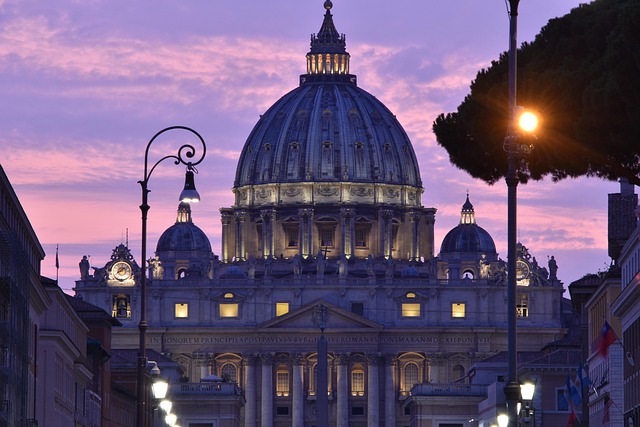
Visione di Pope Leo Xiv: abbracciare l'intelligenza artificiale nel papato moderno
Nel maggio 2025, la Chiesa cattolica assisteva a un evento storico con l'elezione di Papa Leo XIV, il primo pontefice americano. (decrypt.co) Nel suo discorso inaugurale, Papa Leo XIV ha identificato l'intelligenza artificiale (AI) come una delle sfide più urgenti per l'umanità. Questo post sul blog approfondisce le implicazioni della sua visione, esplorando l'intersezione tra AI e Chiesa cattolica, le considerazioni etiche e i potenziali percorsi in avanti.
L'elezione di papa leo xiv
Un momento storico per la chiesa
Papa Leo Xiv, nato Robert Prevost a Chicago, nell'Illinois, fu eletto come il 267 ° Papa della Chiesa cattolica romana. La sua elezione ha segnato un momento significativo nella storia della chiesa, non solo a causa della sua eredità americana, ma anche a causa del suo background di frate e matematico agostiniano. (decrypt.co)
il significato del nome papale
Scegliendo il nome Leo Xiv, il nuovo papa rende omaggio al suo omonimo, Papa Leo XIII, che prestò servizio dal 1878 al 1903. Papa Leo XIII era rinomata per aver affrontato le questioni sociali durante la rivoluzione industriale, in particolare attraverso i suoi enciclici *rerum novarum *, che si era concentrato sui diritti degli assistenti e per il ruolo del ruolo di assistenza sociale. (irishtimes.com)
papa leo xiv l'indirizzo sull'intelligenza artificiale
AI come preoccupazione centrale
Nel suo primo pubblico formale con i cardinali, Papa Leo Xiv ha sottolineato la necessità che la chiesa si impegnasse con le sfide poste dall'IA. Ha dichiarato che l'IA presenta nuove sfide per la difesa della dignità, della giustizia e del lavoro umani. (irishtimes.com)
disegnare parallelismi con papa leo xiii
Papa Leo XIV ha disegnato un parallelo tra l'era attuale e la rivoluzione industriale affrontata da Papa Leo XIII. Ha osservato che proprio come la chiesa ha risposto alle questioni sociali della prima rivoluzione industriale, ora deve rispondere agli sviluppi dell'IA che pongono nuove sfide per l'umanità. (irishtimes.com)
considerazioni etiche nello sviluppo dell'IA
La posizione del Vaticano sull'intelligenza artificiale
Il Vaticano è stato proattivo nell'affrontare le implicazioni etiche dell'IA. Nel 2023, Papa Francesco descrisse l'IA come "la scommessa più alta del nostro futuro" e sollecitò che fosse sviluppato per servire il miglior potenziale dell'umanità. (decrypt.co)
la Roma chiama per etica dell'IA
Nel 2020, il Vaticano lanciò la "Roma Call for Ai Ethics", un'iniziativa che riunì leader religiosi e politici, insieme a aziende tecnologiche come Microsoft, IBM e Cisco. Questa collaborazione mirava a promuovere lo sviluppo di tecnologie AI responsabili e socialmente vantaggiose. (politico.eu)
potenziali impatti dell'intelligenza artificiale sulla società
minacce all'occupazione e all'equità
Papa Leo XIV ha sottolineato le preoccupazioni che l'IA potesse minacciare posti di lavoro, equità e dignità umana. Ha sottolineato la necessità di un uso responsabile e esigente dell'intelligenza artificiale per garantire che beneficia di tutta l'umanità. (wmal.com)
Il rischio di armi autonome
Il Vaticano ha anche espresso preoccupazione per l'uso dell'IA nella guerra, in particolare lo sviluppo di armi autonome. Papa Francesco ha avvertito che nessuna macchina dovrebbe mai scegliere di prendere la vita di un essere umano, sottolineando le implicazioni etiche della delegazione delle decisioni di vita e morte alle macchine. (politico.eu)
Il ruolo della chiesa nel guidare lo sviluppo dell'IA
sostenendo la dignità umana e la giustizia
La visione di Papa Leo Xiv chiede alla chiesa di svolgere un ruolo fondamentale nel guidare lo sviluppo dell'IA, garantendo che si allinei ai principi della dignità umana, della giustizia e del bene comune. Ciò implica l'impegno nel dialogo con tecnologi, politici ed etici per modellare la traiettoria dell'IA in un modo che serve il migliore interesse dell'umanità. (politico.eu)
ponte tradizione e modernità
Rivolgendosi all'IA, Papa Leo Xiv cerca di colmare la ricca tradizione della chiesa con le sfide del mondo moderno. Questo approccio riflette un impegno ad affrontare le questioni contemporanee pur rimanendo radicati nei valori duraturi della chiesa. (irishtimes.com)
Conclusione
L'identificazione dell'IA da parte di Papa Leo XIV come sfida critica sottolinea la posizione proattiva della chiesa nell'affrontare le moderne questioni tecnologiche. Disegnando parallelismi con risposte storiche all'industrializzazione, il Vaticano mira a guidare lo sviluppo dell'IA in un modo che sostiene la dignità umana e promuove la giustizia sociale. Mentre l'IA continua a evolversi, l'impegno della chiesa con questa tecnologia sarà cruciale nel modellare un futuro che riflette i suoi insegnamenti etici e l'impegno per il bene comune.

Per ulteriori approfondimenti sulla prospettiva del Vaticano sull'intelligenza artificiale, puoi fare riferimento ai seguenti articoli:
-
Pope Leo XIV sets out vision for papacy and cites AI as critical challenge facing humanity
-
First American Pope Leo Says AI Poses 'New Challenges' for Humanity
-
Leo XIV lays out vision of papacy and identifies AI as challenge for humanity
-
Pope Leo XIV Warns AI Could Threaten Jobs, Fairness, and Dignity
-
Pope Leo XIV's Progressive Vision: Embracing AI in the Modern Papacy
-
Is AI the Greatest Threat to Human Dignity? Pope Leo XIV Thinks So
Esplorando queste risorse, i lettori possono ottenere una comprensione globale dell'impegno del Vaticano con l'IA e le sue implicazioni per la società.